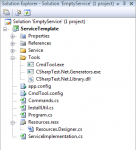
Continued from “Building a Windows Service – Part 5: Adding command-line installation” So we have a working service it’s time to start adding some logging. Proper event logging is critical to monitoring services so we are not going to use .NET’s typical excuse for events. Rather we are going to build a ‘real’ message dll [...]




